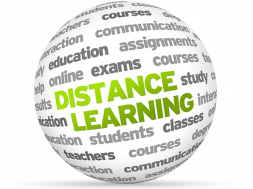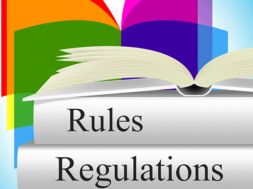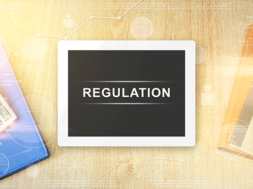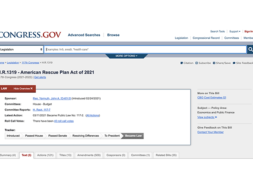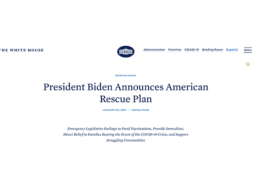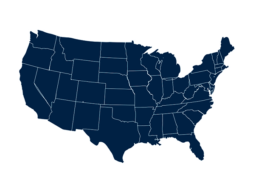
Preparing for the Department’s New State Authorization Rule
By Aaron Lacey, Partner, Thompson Coburn’s Higher Education practice and Editorial Director, REGucation, the firm’s higher education blog
As institutions with online programming are well aware, the U.S. Department of Education’s new “state authorization” rule is set to go into effect this coming July 1, 2018. The current regulations governing state authorization of postsecondary institutions participating in the Title IV programs are located at 34 C.F.R. § 600.9. The new rule adds several concepts to this section, requiring, among other things, that institutions demonstrate that they are authorized to offer their online programs in every state where they enroll students who receive Title IV aid and make a host of new disclosures to students enrolled in online, Title IV programs. Finally, though not discussed here, the rule includes new requirements for additional locations located in foreign countries.
As this article goes to press, whether and to what extent the regulation will become effective on July 1, 2018, is unclear. It appears likely that the current administration will act to delay the rule in some form or fashion. The rule was noted as a target for reform as early as January 2017, and a proposed rule titled “State Authorization, Delayed Effective Date” was submitted to the Office of Management and Budget (OMB) for review on April 19, 2018. The current administration also could release guidance that differs significantly from the comments that accompanied the promulgation of the final rule thereby departing from the views of the prior administration and potentially augmenting the practical impact of the new regulation.
In addition to the intentions signaled by the current administration, there are those in Congress who have indicated that they would like to see the rule eliminated as part of the current reauthorization of the Higher Education Act. Language to this effect is included in Section 495 of the PROSPER Act. But again, whether such language will appear in any final reauthorization legislation is entirely unclear, as is when reauthorization might actually occur.
In addition to the uncertainty surrounding the rule’s effective date, there also are numerous concerns regarding the practical implementation of the rule.
As schools have worked to operationalize the authorization and disclosure requirements, the regulated community has sought guidance and clarification on a number of points, including a notion of student residency that is foundational to the rule. Unfortunately, these efforts have met with little success.
Despite this lack of clarity regarding both the substance and effective date of the rule, most institutions appear to be interpreting the new law to the best of their ability and making a good faith effort to comply. Many have concluded, and we believe rightly so, that even if the federal state authorization rule were delayed or significantly modified, institutions with online offerings would do well to carefully monitor state authorization and reciprocity requirements and to ensure that prospective online students are receiving clear pre-enrollment disclosures regarding authorization, professional licensure, and other relevant topics. There is no question that an abundance of aggressive plaintiff’s attorneys and attorneys general, the emergence of a new borrower defense framework, and existing state and federal consumer protection laws all are good reasons to do so.
With these various and varied thoughts in mind, we examine below the two components of the new rule that apply to distance education programs, looking first at the state authorization requirements and then at the new disclosure obligations. In each instance, we have utilized a question and answer format in an effort to make the information more digestible.
State authorization
Q: What is the purpose of the new state authorization requirement?
A: The purpose is to require institutions offering programs through distance education (or correspondence) to be authorized by each state in which they enroll students if such authorization is required by the state.
Q: Which schools are covered?
A: Any institution participating in the Title IV programs and offering postsecondary education through distance education to a student residing in a state in which (i) the institution is not physically located, or (ii) the institution is otherwise subject to that state’s jurisdiction, as determined by that state.
Q: What does a school have to do if it is covered?
A: Covered institutions must meet state authorization requirements in any state in which an enrolled student resides and be ready to document such authorization. In addition, for states in which the institution is not physically located but has a student residing, the institution must be able to document that there is a state process for review and appropriate action on student complaints.
Q: What if a school participates in a state authorization reciprocity agreement?
A: The institution is considered to meet state authorization requirements in participating states, subject to any limitations in the agreement and any state requirements outside of the agreement. Regarding complaints, institutions must document that students can lodge complaints pursuant to the reciprocity agreement either with the state in which the students reside or the state in which the institution’s main campus is located.
Q: What if a program is not Title IV eligible?
A: The new rule does not apply to programs that are not Title IV eligible.
Q: What if a program is Title IV eligible but a student in a particular state is not receiving Title IV aid?
A: The requirements would still apply, and an institution would be expected to make a good faith effort to comply. However, if an institution fails to obtain or maintain authorization in a state, the program only loses Title IV eligibility for the students residing in that particular state. Thus, if the only student in a particular state is a non-Title IV student, a failure to obtain authorization in that state would not appear to lead to any clear economic consequence.
Q: What does it mean for a student to “reside” in a state?
A: The Department has indicated that a student is considered to reside in a state if the student meets the requirements for residency under that state’s law. This holds true for military personnel as well. Significantly, an institution may rely on a student’s self-determination and certification regarding residency unless the institution has conflicting information.
Q: What if the student “resides” in one state but is living or working in another while enrolled?
A: For purposes of complying with the new federal rule, institutions should seek authorization from the state of residence, as determined and certified by the student. However, institutions also should be mindful of whether educational activities in the state where the student is living or working would trigger authorization requirements, independent of the Department’s residency-based requirements.
Q: If neither the student nor the school is in the student’s state of residence, must the school still be authorized in the state of residence?
A: Yes. Even if neither student nor school is in the student’s state of residence, and there is no educational activity occurring there, the Department takes the view that the school must be authorized in the student’s claimed state of residence.
Q: Does the new rule extend to hybrid programs?
A: Yes. It is the Department’s view that the rule still applies to students taking a portion of a hybrid program through distance education.
Disclosures for distance education programs
Q: What is the purpose of the new disclosures?
A: The stated purpose is to create “additional protections that do not exist for students enrolling in traditional programs.” It was the former administration’s view that the distance education sector “has been fraught with problems where students were not provided adequate information that may have informed them of deficiencies in a particular program and these disclosures for distance education programs are intended to address this problem.”
Q: Which schools are covered?
A: Any Title IV-eligible institution offering an educational program that is provided, or can be completed, solely through distance education or correspondence courses, excluding internships and practicums.
Q: What if the school participates in a state authorization reciprocity agreement?
A: Institutions that are a party to a state authorization reciprocity agreement are not exempt from the disclosure requirements. However, their participation in a covered agreement will impact the substance of the disclosures.
Q: What does a school have to do if it is covered?
A: Covered institutions must make certain disclosures “available” to enrolled and prospective students and make other specified disclosures “directly and individually” to enrolled and prospective students. In specified circumstances, schools also must obtain confirmation of receipt from prospective students.
Q: What are the disclosures that an institution must “make available”?
A: Institutions must make the following disclosures available to students on their websites or in institutional publications:
- State authorization. Whether the institution is authorized by each state in which enrolled students reside or, alternatively, through a state authorization reciprocity agreement.
- Consequences of residency change. The consequences if a student changes his or her state of residence to a state where the institution is not authorized or does not meet professional licensure or certification requirements.
- Description of complaint process. The process for submitting complaints (i) in the state where the school’s main campus is located and in every state where enrolled students reside, or (ii) pursuant to the National Council for State Authorization Reciprocity Agreement NC-SARA participation terms.
- Historic adverse actions. For the five calendar years prior to the year of the disclosure, any adverse actions a state or accreditor has initiated, including years initiated, relating to programs offered solely through distance education.
- Refund policies. Refund policies with which the institution must comply in any state in which enrolled students reside.
- Licensure and certification prerequisites. Schools must disclose, (i) the educational prerequisites for professional licensure or certification in any state where enrolled students reside or the institution has made a determination regarding requirements, (ii) whether the program satisfies the noted prerequisites in such states, and (iii) for all other states, a statement that no determination has been made.
Q: What are the disclosures that an institution must make “directly and individually?”
A: Institutions must make the following disclosures directly and individually, as indicated:
- Licensure and certification changes. To prospective and enrolled students, any determination by the institution that a program offered solely through distance education ceases to meet licensure or certification prerequisites of a state, within 14 calendar days of the determination.
- Notice of new adverse actions. To prospective and enrolled students, any adverse action initiated by a state or accreditor relating to a program offered solely through distance education, within 30 calendar days of the institution becoming aware of the action.
- Licensure and certification determinations. To prospective students, prior to their enrollment in a program offered solely through distance education, any determination that the program does not meet licensure or certification prerequisites in the prospective student’s state of residence. If a disclosure is made and the student enrolls, the institution also must obtain and maintain signed acknowledgement of receipt of the disclosure.
Q: What is the required format for the disclosures?
A: The Department has declined to specify a format for the disclosures but has allowed that an institution may combine the disclosures or provide them separately as it sees fit.
Q: How frequently are schools expected to update information regarding licensure and certification prerequisites?
A: The Department also has declined to specify a timeframe for updating the disclosures but has indicated that updates should be made regularly to ensure that each prospective student receives accurate data.
Q: Must institutions disclose the refund policy for every state where an enrolled student resides?
A: Institutions are required to disclose any refund policies with which they must comply. If a state does not specify a policy, or the institution is not required to comply with a policy pursuant to SARA terms, there would be no disclosure obligation.
Q: What licensure and certification prerequisites must be disclosed?
A: The disclosure is limited to licensure or certification prerequisites that are established under state law as prerequisites to work in the jobs associated with the program. Programmatic accreditation, third-party certifications, and similarly, desirable attainments would not be covered unless they also were required under applicable state law.
Q: How does a school know which jobs are “associated” with its program?
A: The Department has indicated that an institution makes the determination about the jobs that are associated with a program when developing the programs and determining how to market it to the public.
Schools looking for additional information regarding the new state authorization rule are welcome to review Thompson Coburn’s April 17 webinar on the topic, which is available free and on demand at https://www.thompsoncoburn.com/insights/tcle/presentation/library.
The purpose of this article is to provide news and information on legal issues. It is not and should not be considered legal advice. Portions of this article first appeared in “Getting Ready for ED’s New State Authorization Rule,” published on April 10, 2018, in REGucation, Thompson Coburn’s higher education blog.
AARON LACEY is a partner in Thompson Coburn’s Higher Education practice and editorial director of REGucation, the firm’s higher education law and policy blog. An experienced attorney, with time served both as outside and in-house counsel, Aaron’s practice is dedicated entirely to assisting postsecondary institutions to navigate complex legal and regulatory matters. He has specialized, substantive expertise in the array of federal, state, and accrediting agency laws and standards that govern postsecondary institutions and is a frequent writer and speaker on topics relating to higher education policy and regulation. In October 2017, Aaron was selected by the U.S. Department of Education to serve as one of 17 negotiators charged with overhauling the Department’s complex and controversial “borrower defense” rule. The Department selected Aaron to represent and negotiate on behalf of general counsels, attorneys, and compliance officers at postsecondary institutions nationwide.
Contact Information: Aaron D. Lacey // Partner, Higher Education Practice // Thompson Coburn LLP // 314-552-6405 // alacey@thompsoncoburn.com // https://www.thompsoncoburn.com/people/aaron-lacey // https://www.linkedin.com/in/aaron-drew-lacey-3353742
